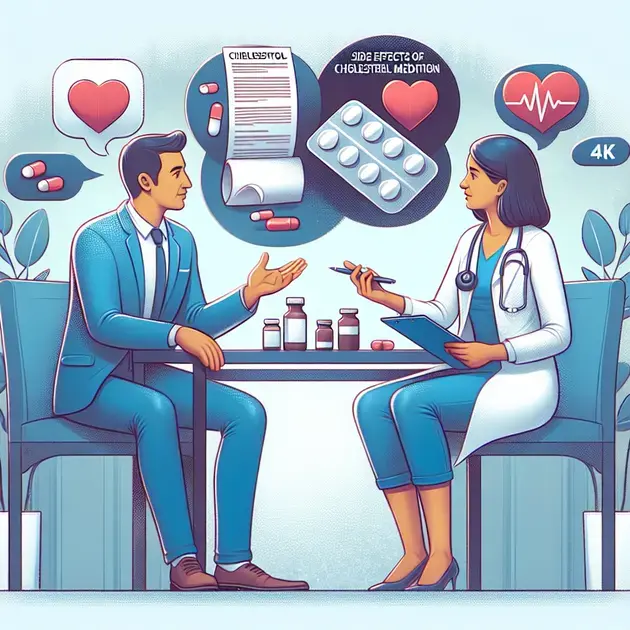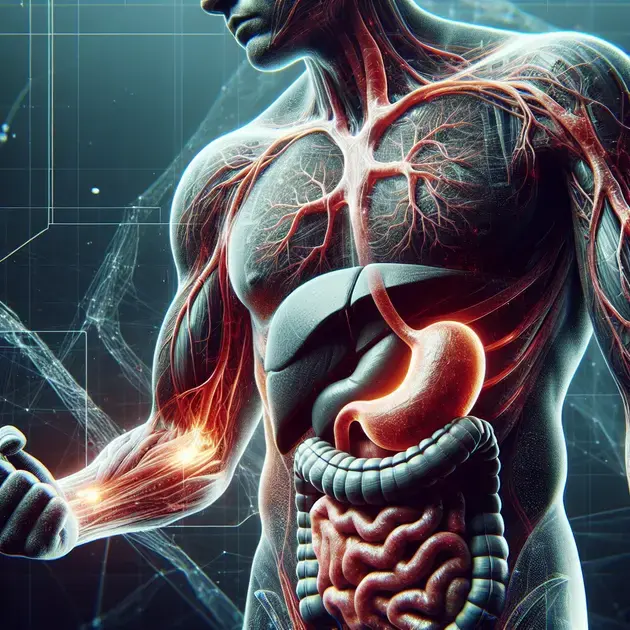Understanding the side effects of cholesterol medicine is crucial for anyone who is currently taking or considering taking this type of medication. With the prevalence of high cholesterol in today’s society, many individuals rely on these drugs to manage their condition and reduce the risk of heart disease.
However, it is important to be aware of the potential side effects that can come with cholesterol medicine. From muscle pain and weakness to liver damage and digestive issues, these medications can have a range of impacts on the body. In this blog post, we will explore some of the common side effects associated with cholesterol medicine and provide tips on how to manage them effectively.

Understanding the Side Effects of Cholesterol Medicine: A Comprehensive Overview
When taking cholesterol medication, it’s crucial to understand the potential side effects that may arise. These side effects can vary depending on the type of medication prescribed and the individual’s response to it. Common side effects of cholesterol medicine include muscle pain, digestive issues, liver problems, and memory loss. To get a comprehensive overview of the side effects associated with cholesterol medication, refer to reputable medical websites such as WebMD or Mayo Clinic. These websites provide detailed information on the potential side effects of different cholesterol-lowering drugs, allowing you to make informed decisions about your treatment.
One effective way to stay informed about the side effects of cholesterol medicine is by reading the drug information leaflet provided by your pharmacist. This leaflet contains essential details about the medication, including its potential side effects, interactions with other drugs, and proper dosage instructions. By carefully reviewing this information, you can proactively monitor your health and report any concerning symptoms to your healthcare provider.
It’s important to note that while cholesterol medication can effectively lower cholesterol levels and reduce the risk of heart disease, some individuals may experience side effects that impact their quality of life. If you encounter persistent or severe side effects while taking cholesterol medicine, do not hesitate to seek medical advice. Your healthcare provider can evaluate your symptoms, adjust your medication if necessary, or recommend alternative treatment options to minimize side effects.
In addition to educating yourself about the potential side effects of cholesterol medicine, it’s essential to maintain open communication with your healthcare team. Inform your doctor about any pre-existing medical conditions, allergies, or medications you are taking to ensure safe and effective treatment. By working closely with your healthcare provider and discussing any concerns or side effects you experience, you can actively participate in managing your cholesterol levels while prioritizing your overall well-being.
Overall, understanding the side effects of cholesterol medicine is key to navigating your treatment journey. By staying informed, communicating openly with your healthcare team, and prioritizing your health, you can effectively manage the potential side effects of cholesterol medication and achieve optimal outcomes for your cardiovascular health.
Common Side Effects of Cholesterol Medication You Should Know About
When taking cholesterol medication, it’s essential to be aware of the common side effects that may occur. These side effects can vary depending on the specific type of cholesterol medicine prescribed, such as statins, bile acid sequestrants, or cholesterol absorption inhibitors. Some common side effects of cholesterol medication include muscle pain or weakness, digestive issues like nausea or diarrhea, liver enzyme abnormalities, and memory problems. Understanding these potential side effects can help you monitor your health and take appropriate actions if needed.
If you are experiencing muscle pain while taking cholesterol medication, it is advisable to consult your healthcare provider. Your doctor may recommend adjusting your dosage, switching to a different type of cholesterol medicine, or incorporating lifestyle changes to alleviate this side effect. Additionally, keeping track of your symptoms and discussing them with your healthcare team can help identify the underlying cause of muscle pain and determine the best course of action for managing it.
In cases where digestive issues such as nausea or diarrhea occur while on cholesterol medication, it is important to stay hydrated, eat a balanced diet, and consider taking the medication with food to minimize gastrointestinal disturbances. If these symptoms persist or worsen, informing your healthcare provider is crucial for determining the appropriate steps to address the digestive side effects effectively.
Liver problems, while less common, can also occur as a side effect of certain cholesterol medications. Monitoring liver function through regular blood tests as recommended by your doctor is essential for early detection of any potential issues. If liver enzyme abnormalities are detected, your healthcare provider may adjust your medication regimen, conduct further tests, or explore alternative treatment options to protect your liver health while managing cholesterol levels effectively.
Memory problems or cognitive issues have been reported as potential side effects of cholesterol medication, particularly in some individuals. If you notice changes in your memory or cognitive function while taking cholesterol medicine, discussing these concerns with your healthcare provider is crucial. Your doctor can assess the situation, consider alternative medications, or recommend strategies to support cognitive health while balancing cholesterol management goals.
Effective Strategies for Managing the Side Effects of Cholesterol Medicine
Managing the side effects of cholesterol medication requires a proactive approach to ensure both your cardiovascular health and overall well-being. One effective strategy is to maintain regular communication with your healthcare team, including your doctor, pharmacist, and any specialists involved in your care. By reporting any side effects you experience promptly and discussing your treatment options openly, you can work together to address concerns, adjust your medication as needed, and optimize your cholesterol management plan.
If you are struggling with common side effects of cholesterol medication such as muscle pain or digestive issues, consider incorporating lifestyle modifications to alleviate these symptoms. Engaging in regular exercise, following a heart-healthy diet, staying hydrated, and getting an adequate amount of rest can positively impact your overall health and may help reduce the occurrence or severity of side effects. Additionally, exploring complementary therapies like yoga, meditation, or acupuncture can provide natural ways to manage discomfort while supporting your treatment regimen.
Education plays a vital role in managing the side effects of cholesterol medicine. Take the time to research and understand the potential side effects associated with your specific medication, and don’t hesitate to ask your healthcare provider any questions you may have. Being well-informed empowers you to recognize warning signs, track your symptoms effectively, and collaborate with your healthcare team to address any issues that arise during treatment.
In some cases, adjusting the dosage or switching to a different type of cholesterol medication may be necessary to minimize side effects while maintaining effective cholesterol management. Your healthcare provider can guide you through this process, considering factors such as your medical history, cholesterol levels, and overall health goals to determine the most suitable treatment plan for your individual needs.
Furthermore, maintaining a positive attitude and a proactive mindset can significantly impact your experience with cholesterol medication and its potential side effects. Stay engaged in your treatment plan, track your progress, celebrate small victories, and seek support from loved ones or a healthcare professional when needed. By approaching cholesterol management holistically and focusing on your well-being, you can navigate the side effects of medication more effectively and achieve better outcomes for your heart health in the long run.

**Potential Side Effects of Cholesterol Medication**
Understanding the Potential Side Effects
When it comes to managing cholesterol levels, medication can be a crucial part of the treatment plan. However, like any medication, cholesterol-lowering drugs can sometimes have side effects. It’s important to be aware of these potential side effects to be able to recognize them early and address them appropriately. Common side effects may include muscle pain, digestive issues, liver problems, and in rare cases, neurological issues. It’s essential to consult with your healthcare provider before starting any cholesterol medication to understand the possible risks.
Monitoring and Managing Side Effects
To combat the potential side effects of cholesterol medication, regular monitoring is key. Keeping track of any symptoms or changes in your health can help you and your healthcare provider address any issues promptly. In some cases, a simple adjustment in dosage or medication type may help alleviate side effects. It’s crucial to follow up with your doctor regularly to discuss any concerns and make necessary adjustments to your treatment plan.
Seeking Medical Attention
While most side effects of cholesterol medication are mild and manageable, there are instances where immediate medical attention is necessary. If you experience severe muscle pain, weakness, yellowing of the skin or eyes, or signs of an allergic reaction such as swelling or difficulty breathing, seek medical help right away. It’s always better to err on the side of caution when it comes to your health.
Exploring Alternative Treatment Options
If you are experiencing troublesome side effects from cholesterol medication, it may be worth exploring alternative treatment options. Lifestyle changes such as diet modifications, increased physical activity, and weight management can sometimes help lower cholesterol levels naturally and reduce the need for medication. Additionally, complementary therapies like acupuncture or herbal supplements may offer additional support in managing cholesterol levels without the side effects of traditional medication.
Final Thoughts
While cholesterol medication can be highly effective in lowering cholesterol levels and reducing the risk of heart disease, it’s essential to be aware of the potential side effects. By staying informed, closely monitoring your health, seeking medical attention when needed, and exploring alternative treatment options, you can better manage any adverse reactions to cholesterol medication and maintain overall well-being.
Conclusion
In conclusion, understanding the potential side effects of cholesterol medication is crucial for effectively managing your health. By being aware of the common side effects such as muscle pain, digestive issues, and liver problems, individuals can take proactive steps to address them early on. It’s essential to consult with healthcare providers before starting any cholesterol medication to mitigate potential risks.
Monitoring and managing side effects play a key role in ensuring the effectiveness of cholesterol-lowering drugs. Regular tracking of symptoms and open communication with healthcare providers enable timely adjustments to dosage or medication type, ultimately improving the overall treatment experience. By maintaining a proactive approach, individuals can minimize the impact of side effects.
Seeking prompt medical attention when necessary is paramount when dealing with severe side effects of cholesterol medication. Symptoms such as severe muscle pain, yellowing of the skin, or signs of an allergic reaction should never be ignored, emphasizing the importance of prioritizing health and well-being. Erring on the side of caution ensures timely intervention and appropriate care.